Cup-a-Soup and Candy Canes (December)
Part of becoming a father is accepting responsibility for how another person turns out. But can you hold your own family responsible too? And is it smart to gather them all on a cruise to find out? Our writer continues his illustrated saga.
PL’s new doctor keeps us in the waiting room for an hour. Our annoyance turns to relief when we meet Ella Garber. She’s a lot like Dr. Manska: eastern European, no-nonsense, reassuringly matter-of-fact. She peppers PL with all sorts of questions about her medical history, menstrual schedule, and other groinal doings. All she asks me: any history of mental retardation? She ignores my feeble jokes.
We have to come back once a month, then twice a month and then weekly for checkups (that means a total of four and half days in that waiting room). Because PL will have had her 35th birthday before the baby is born, she will have to have two sonograms and something called an amniocentesis. (Dr. Garber’s accent is such that she had to repeat the term three times before we understood what she meant).
All this talk of retardation and extra risk freaks me out a little. Then Patti and the doctor go across the hall, where PL has to pee in a cup and get an internal exam while I sit in the doctor’s private office and try to read a three-month-old magazine. Parenting is full of cheery pictures of pudgy babies, ads for minivans and nursery monitors, and various tidbits about all the horrors that can befall a pregnant woman or a tiny baby.
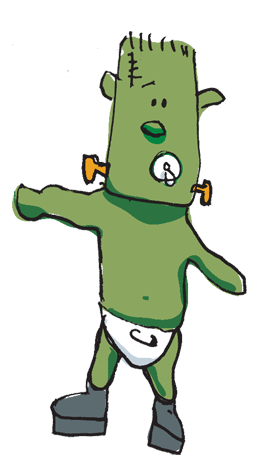
When Dr. Garber comes back, my head is reeling with new terrors and I brace for the worst. My vocabulary is now enlarged to include words like spina bifida, ectopic pregnancy, hypothyroidism, preeclampsia, and placenta previa. Garber is tight-lipped, and her only comment is that PL can’t use a seasickness patch on the cruise. Meanwhile my head is buzzing with syndromes: Klippel-Feil, Mobius, Waardenburg, Hirschsprung’s, Tay-Sachs, Gaucher, Canavan… Then she adds that the only drug PL can take is Tylenol (dwarfism, Down syndrome, autism, hare lips, club feet, flipper boy, lobster girl, wolf man…). I ask her if everything is OK (cystic fibrosis, torticollis, craniosynostosis, abruptio placentae…) and mention that Patti is a bit nervous (pelvic deformation, incontinentia pigmenti, anemia, pulmonary embolism…) and the doctor agrees, adding, “She has nothing to be nervous about. She is a very healthy, pregnant lady.”
See, I knew she was pregnant.
Again, we are expecting some sort of briefing or advice on how to be pregnant but there is none. We do receive a goody bag of vitamin samples and various pamphlets on caring for and naming children.
PL has to get some blood tests done, and on future visits she’ll also meet the other doctors, in case she goes into labor when Dr. Garber’s not on duty. That seems unlikely, as most of the other doctors are also Drs. Garber (her two sons and husband), but there is one non-Garberian practitioner.
During the exam, apparently the doctor actually reached in and could feel the embryo-—how weird. PL confides to me that she had been so nervous that she had a massive tumor or something and was enormously relieved and chipper after the exam. I laugh and say, “Don’t be ridiculous. I always knew everything would be fine.”
Back at home, we call Pipsi to tell her all is well and she gives us an obviously well-rehearsed speech to the effect that we should stop behaving as if pregnancy is an illness, which, of course, I deny we were doing.
PL has a longish chat with her sister, one of the few people we know who has had a baby in the last 30 years. Debbie tells PL that she too hadn’t had morning sickness, that breast feeding is a time-consuming luxury and that it will all be great fun.
We’re a little suspicious of our parents’ perspectives; they all come from the “just squat behind a bush, pop it out, then get right back to washing your sheets in the river” school of obstetric health. It seems all their doctors told them to do was to switch to filter tips. It’s nice to get council from someone who’s heard of disposable diapers.
And that’s hard to come by. Even though we’re not spring chickens or traditionalists, we were the first of our friends to get married and are now the first to have a young ‘un. There was no one to turn to for first-hand advice on the former or, now, the latter.
I tell Mark, one of my work pals, about the baby. He’s the first person I’ve told outside of our family. It still feels awkward to introduce the subject. My life doesn’t seem to contain many natural segues to the topic of childbirth.
I have dinner alone with Pipsi. She exhorts me again not to think of pregnancy as a disease.
Cousins Joey and Jessica give us our first baby gift, a brown teddy bear. They suggest we name the babies Butch and Celeste. They’re joking, I think.
We are growing kind of used to the idea of being parents now. Patti is in a great mood most of the time, though she went through a couple of days during which she was convinced she was not pregnant because she felt so good. “Maybe they made a mistake,” she said. “Seriously.” We’ll have to give back the teddy bear.
There are times she feels vaguely nauseated, but that seems due to the fact that she is drinking milk (which she totally hates) and eating a lot of varied foods at every meal. Her sense of smell has become extremely sensitive and she gets distracted by street smells, car fumes, garbage—things like that. Her perfumes, like Route du Thé and Shalimar, no longer smell right to her. PL says her clothes are starting to feel tighter. Last night she bought a cardigan and asked me if I thought it was the sort of thing someone’s mother would wear. I love her very much.
According to What to Expect…, the baby is now about an inch long and has elbows and a penis or clitoris. I imagine him or her curled up, fingerless mitts tucked in, half body, half head. It’s like an unshelled peanut, only with bones.
So we go on this cruise. There’s enormous potential for disaster, starting with the whole idea of a cruise, which feels hopelessly bourgeoisie. I am far too embarrassed to tell my friends in New York that I am going to be spending 10 days cruising between buffets and tributes to the Lawrence Welk Show while they smoke Gitanes and discuss experimental cinema, Middle Eastern politics, and large breasts.
Pipsi has been doing some consulting work for Celebrity Cruises and gone on several different ships as part of her work. Gran, who is almost 90, will be visiting her from Jerusalem and so she has decided that, rather than sitting around her apartment, through another hated Christmas, she and Miranda will take him to sea.
Our desire to not go to Cleveland and Mickey and Phyl’s surprise acceptance of our offhand invitation have filled out the party.
In my mind, the trip is the first chance to draw the various genetic donors together. It seems to me that there is something momentous in the gathering, sort of like the Yalta conference, when FDR, Churchill, and Stalin decided how to carve up the globe after WWII. We’re no longer just a bunch of people united by marriage, glorified former wedding guests. When the baby is born, we’ll be a family, a clan whose bloodlines are merged and will be forever one in some little person’s family tree. As usual, I am the only one all swept away by the significance. Everyone else just sees the cruise as a chance to graze buffets, gamble, and sit in the sun.
Let’s meet the players. The whole thing feels a little biblical as we file aboard, two by two plus Gran.
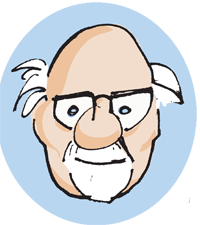
Let’s examine him first. He is a smallish, deafish, baldish man, with a snow white goatee and blue-gray eyes. Though he is quite ancient, he is also very smart and quite judgmental. Gran was born in what was Poland, escaped the Gestapo, went to medical school in Germany, then escaped the fascists again in Italy and went to British India. He and my grandmother raised my mother and my uncle in what became Pakistan, then escaped the Islamic fundamentalists and went to Jerusalem. Cruise highlight: monitoring the only passenger his senior, a half-dead bugger whose relatives forced him, in his walker, to wear long cardboard ears and play Pin the Tail on the Donkey.
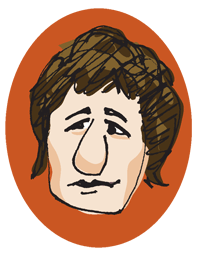
Alongside him comes Pipsi. She still works quite hard doing market research and travels whenever she can. Since I was very small, she has encouraged me to be independent and, as soon as I could be trusted with a stove, to make her cups of tea. She likes weirdness and hates people who are lazy and average. She has always been concerned with injustice and suspicious of authority. She makes great salad dressing and spaghetti sauce. She’s very strong, very smart, very opinionated, and generally disapproving. Much of the time she’s right and most of the rest of the time she’ll insist she is. When I need her, she’s there for me, but after the crisis passes she quickly makes everything about her again. She can drive me crazy, but I love her. Cruise highlight: winning big in the ship casino and using the word “fuck” liberally at Christmas dinner.
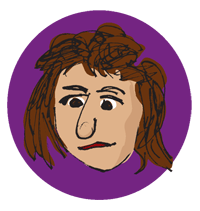
Behind them on the gangplank, my sister, half-sister, technically. Miranda is seven years younger than I am. The petty rivalries that kept us apart when we were younger have ebbed of late; much of the credit for that goes to Patti. Miranda and Patti have grown very close and think of each other as sisters, which makes me feel very warm. I’ve only met Miranda’s boyfriend, Brian, a couple of times; he’s a sweet guy, but the whole family seems to feel we can help her find someone better. Top cruise experience: being pursued by “Froggie” the amorous cruise social director—he quadruples as a puppeteer (thus, Froggie, after the hand puppet he uses to chase bikinied girls around the pool), the DJ in the ship disco, and, on Sabbath eve and much to Gran’s consternation, the ship’s rabbi.
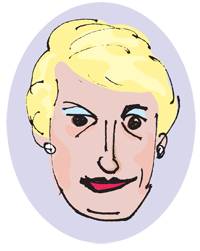
Phyllis is Patti’s mom and she is very sweet. She works in the receipts payable office of the May Co. and owns many, many shoes, which she keeps in their original boxes. I’ve always liked talking to her, and she reminds me a lot of her daughter, though blonder and with teal eye shadow. She is easy to tease and loves to laugh and smoke. Top cruise experience: worrying which Liz Claiborne outfit to coordinate with which ship social event.
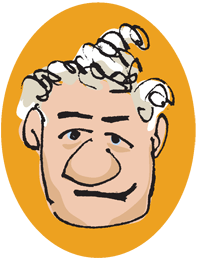
Mickey should have been a politician. He loves to meet people and can talk and talk. When she was a kid, Patti dreaded getting into trouble, though her only punishment would be a lecture. He would drone on and on endlessly until she wished he’d just spank her and get it over with. Despite his garrulousness, he has a shy side. While he plays the accordion very well (and each polka mixes seamlessly into the next until you wish you hadn’t asked him to start), he will rarely do it in front of more than one or two people. After years of managing the deliveries of a Cleveland paper, he is now a school bus driver. Top cruise experience: snoring so loudly in the ship cinema that he is ejected by three other passengers.
Despite all my romantic visions of family togetherness, these people have very little in common and are all annoying in different ways. My grandfather is virtually stone deaf and always on the lookout for perceived anti-Semitism. My mother can take offense at most anything. My sister always wants to flee the table and smoke on the poop deck. Mickey can corner a hapless waiter and grill him until he finds out that they have something in common (the waiter’s from Colombia, Mickey doesn’t drink Colombian or any other kind of coffee; the waiter’s serving bass tonight, Mickey once owned a pair of Bass Weejuns). Phyllis can’t imagine why anyone would eat oysters or sweetbreads or Japanese food. Patti complains she can’t have Christmas cocktails. And I am probably most annoying of all, snickering in the corner with Patti or strutting around with my suntan lotion-stained copy of Dr. Spock.
My main takeaway from studying this bunch of would-be ancestors is what incredible impact families have on individuals throughout their lives. Pipsi, menopausal, is still Gran’s child and plagued by guilt, anger and memories of long bygone wounds. I, in turn, am still bitter about things that happened to me when I was two and can never really see my mum or Gran objectively today. Miranda is still terribly involved with Pipsi; her feelings are fragile and always black and blue. Her biggest fear: to become “Pipsi Jr.” Even Mickey and Phyl, who are very easygoing and Ohioan, can push Patti’s buttons and drive her up the wall.
I’m under no illusion that our impact on the Peanut will be any different, but I have been convincing myself that we will be so much more reasonable. Most of what I see in my family hinges on guilt, manipulation, resentment, grudges, and a refusal to just drop things for the greater good or for the sake of kindness. Even when we do help each other out, it is generally accompanied by a putdown or with a suggestion that the bill will eventually come due. It’s ugly to see. I hope I won’t be so intent on being right, on using others weaknesses to make me feel strong. And I hope our baby will grow up with a strong sense of confidence and happiness. I’m going to have to control my tendency to be overbearing, to always want to be right, to react without thinking.
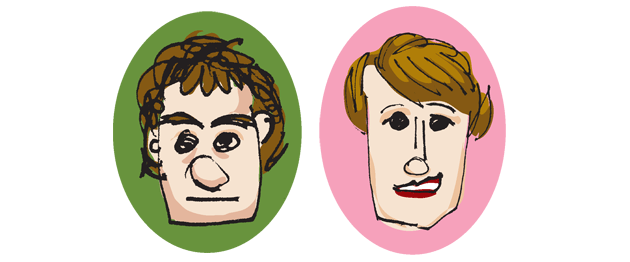
After Pipsi was a little too bad tempered one day, I tell Patti we have to start thinking of ourselves (PL & me) as a family unit, that we are at the head of the table now, no longer a lower echelon of the family at large. I tell her I think that we should think about how we will celebrate Christmas at our home from now on but Patti doesn’t much like the idea. Perhaps I am too vociferous as I try to hack through my own umbilical cord.
At our final dinner, Pipsi makes a toast: “I think that in the year to come, I shall be spending a lot less time with the family.” We should have done more drinking.
Back home, we visit the doctor again. There is no wait this time and the visit is very brief, mainly a review of the tests PL had last month and a pelvic exam. For the first time, I get to see someone else put their dirty paws up my woman’s vagina. I survive.
PL has to redo one of her blood tests (personally, I never failed a test in my life) but Gran assures us that the odds of her having toxoplasmosis (from eating contaminated cat shit) are extremely long. Of course, he graduated from medical school in 1936.
